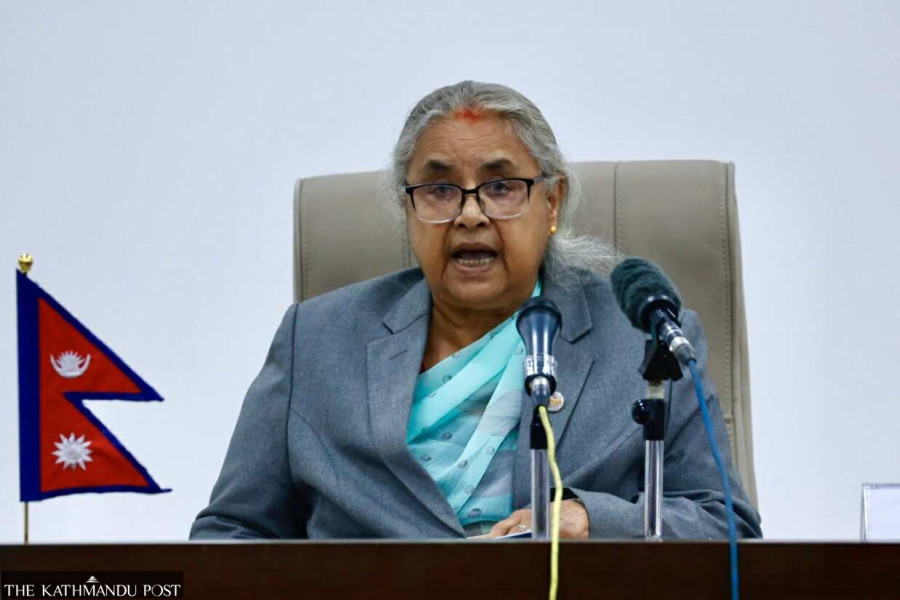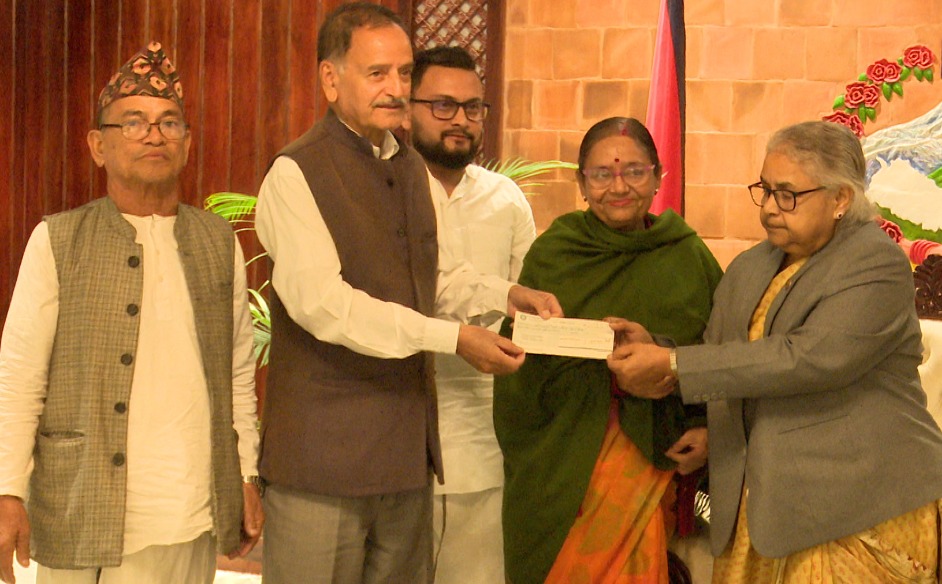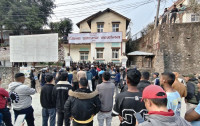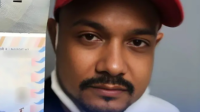National
PM invites parties for talks tomorrow
Initiative comes amid charges by political parties that the government has failed to create an environment for polls.
Purushottam Poudel
Prime Minister Sushila Karki has invited national political parties to a roundtable for Tuesday afternoon. In a letter on Sunday evening, she has asked seven parties to send two senior representatives each for the talks to be held at the prime minister’s residence at Baluwatar at 4 pm.
Major political parties, especially the Nepali Congress and the CPN-UML, have been accusing the interim government of failing to initiate dialogue to create a conducive environment for the March 5 elections.
The prime minister’s office had already been in informal and individual-level consultations with leaders from various parties.
Former chief justice Karki was appointed prime minister of an interim government on September 12 after a violent youth-led anti-corruption movement toppled the KP Sharma Oli-led government on September 9.
Shortly after her appointment, the House of Representatives was dissolved, and the next parliamentary elections were announced for March 5.
During a meeting convened by the Election Commission on October 16, senior leaders of the major parties criticised the government for failing to create a favourable election environment.
The government held several rounds of informal meetings with leaders from various political parties to lay the ground for the formal meeting.
According to a Congress leader, Acting President of the Congress Purna Bahadur Khadka and General Secretary Bishwa Prakash Sharma met Prime Minister Karki at the Prime Minister’s Office on the same day the Election Commission held discussions with party leaders.
“The two Nepali Congress leaders–Khadka and Sharma–held discussions with the prime minister on the upcoming elections,” the leader said.
Minister for Energy, Water Resources and Irrigation Kulman Ghising told the Post that the talks were focused on elections. He, however, did not disclose the details.
Khadka confirmed the meeting with Prime Minister Karki on October 16.
“It is true that we met the prime minister, but the meeting was not related to elections,” Khadka told the Post, refusing to disclose further details.
Similarly, on October 15, Congress leader Krishna Prasad Sitaula visited Prime Minister Karki at Baluwatar. Although Sitaula reportedly went there in his capacity as a representative of a social organisation to discuss relief efforts for those affected by the natural disaster that struck Nepal in the first week of October, sources at Baluwatar claimed that during the meeting, Prime Minister Karki and Sitaula held a separate one hour-and-a-half-hour-long discussion on political matters.

While the Congress leaders met the prime minister on October 15 and 16, senior leaders of the CPN (Maoist Centre), Narayan Kaji Shrestha and Barsaman Pun, also visited Baluwatar on October 17. Shrestha said they had gone at the prime minister’s request to hold discussions focussed on the upcoming elections.
During the meeting, Shrestha said they emphasised that elections were the only way to steer the country out of the current situation. “We urged the prime minister to conduct the elections in a free, fair, and fearless environment,” he said.
He further said that his party was prepared for the elections and had conveyed to the government that it firmly favours holding polls. At present, no party other than the UML has considered alternatives, Shrestha added, expressing confidence that even the UML would eventually take part once a conducive environment was created. The UML is considering challenging the House dissolution in court.
“During our meeting with Prime Minister Karki, we gave some categorical suggestions that the government must create an environment favourable to elections, work to boost the morale of the demoralised police force, and initiate collective dialogue with all political parties,” Shrestha said.
According to the sources, the government is also in contact with UML leaders and that there have already been informal talks with some of them.
To facilitate these talks, the prime minister had assigned specific roles to Finance Minister Rameshore Khanal, Home Minister Om Prakash Aryal, Energy Minister Kulman Ghising, and Information and Communication Minister Jagadish Kharel.
The sources claimed that, in line with their assigned responsibilities, these ministers have been engaging in dialogue with political leaders with whom they maintain personal or professional relations.
The prime minister’s move has come at a time when UML leaders insisted that the government hold serious negotiations immediately. UML Deputy General Secretary Pradeep Gyawali earlier on Sunday said that the government should hold formal talks with political parties rather than relying solely on informal discussions.
“Informal meetings can happen between anyone at any time,” Gyawali said. “But given the country’s current crisis, the government must initiate formal dialogue with political parties.”
Gyawali argued that the government’s stance has created confusion. He said it on one hand talks about filing cases against political leaders (in connection with the suppression of last month’s movement and corruption), and on the other, claims to be working to create an environment for elections.
Maoist Centre leader Shrestha the claim that poll environment is being created is not enough. He said not only the political parties but the general public must also feel safe during elections, and that such a situation is yet to be developed.
Shrestha recalled that thousands of prisoners who escaped from jails from various parts of the country during the September 9 unrest are still at large, and over a thousand police weapons that were looted on the same day have yet to be recovered.
He said it is valid to question security guarantees under such circumstances.




 12.12°C Kathmandu
12.12°C Kathmandu














